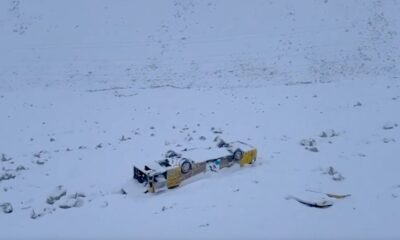Science & Technology
Asteroid will pass in front of bright star Betelgeuse to produce rare eclipse visible to millions

One of the biggest and brightest stars in the night sky will momentarily vanish as an asteroid passes in front of it to produce a one-of-a-kind eclipse.
The rare and fleeting spectacle, late Monday into early Tuesday, should be visible to millions of people along a narrow path stretching from central Asia’s Tajikistan and Armenia, across Turkey, Greece, Italy and Spain, to Miami and the Florida Keys and finally, to parts of Mexico.
The star is Betelgeuse, a red supergiant in the constellation Orion. The asteroid is Leona, a slowly rotating, oblong space rock in the main asteroid belt between Mars and Jupiter.
Astronomers hope to learn more about Betelgeuse and Leona through the eclipse, which is expected to last no more than 15 seconds. By observing an eclipse of a much dimmer star by Leona in September, a Spanish-led team recently estimated the asteroid to be about 34 miles wide and 50 miles long (55 kilometers wide and 80 kilometers long).
There are lingering uncertainties over those predictions as well as the size of the star and its expansive atmosphere. It’s unclear if the asteroid will obscure the entire star, producing a total eclipse. Rather, the result could be a “ring of fire” eclipse with a miniscule blazing border around the star. If it’s a total eclipse, astronomers aren’t sure how many seconds the star will disappear completely, perhaps up to 10 seconds.
“Which scenario we will see is uncertain, making the event even more intriguing,” said astronomer Gianluca Masa, founder of the Virtual Telescope Project, which will provide a live webcast from Italy.
An estimated 700 light-years away, Betelgeuse is visible with the naked eye. Binoculars and small telescopes will enhance the view. A light-year is 5.8 trillion miles.
Betelgeuse is thousands of times brighter than our sun and some 700 times bigger. It’s so huge that if it replaced our sun, it would stretch beyond Jupiter, according to NASA.
At just 10 million years old, Betelgeuse is considerably younger than the 4.6 billion-year-old sun. Scientists expect Betelgeuse to be short-lived, given its mass and the speed at which it’s burning through its material.
After countless centuries of varying brightness, Betelgeuse dimmed dramatically in 2019 when a huge bunch of surface material was ejected into space. The resulting dust cloud temporarily blocked the starlight, NASA said, and within a half year, Betelgeuse was as bright as before.
Scientists expect Betelgeuse to go supernova in a violent explosion within 100,000 years.
Science & Technology
Australia social media ban set to take effect, sparking a global crackdown
For the social media businesses, the implementation marks a new era of structural stagnation as user numbers flatline and time spent on platforms shrinks, studies show.

Australia is set to become the first country to implement a minimum age for social media use on Wednesday, with platforms like Instagram, TikTok and YouTube forced to block more than a million accounts, marking the beginning of an expected global wave of regulation.
From midnight, 10 of the biggest platforms will be required to block Australians aged under 16 or be fined up to A$49.5 million ($33 million), Reuters reported.
The law received harsh criticism from major technology companies and free speech advocates, but was praised by parents and child advocates.
The rollout closes out a year of speculation about whether a country can block children from using technology that is built into modern life. And it begins a live experiment that will be studied globally by lawmakers who want to intervene directly because they are frustrated by what they say is a tech industry that has been too slow to implement effective harm-minimisation efforts.
Governments from Denmark to Malaysia – and even some states in the U.S., where platforms are rolling back trust and safety features – say they plan similar steps, four years after a leak of internal Meta (META.O) documents showed the company knew its products contributed to body image problems and suicidal thoughts among teenagers while publicly denying the link existed.
“While Australia is the first to adopt such restrictions, it is unlikely to be the last,” said Tama Leaver, a professor of internet studies at Curtin University.
“Governments around the world are watching how the power of Big Tech was successfully taken on. The social media ban in Australia … is very much the canary in the coal mine.”
A spokesperson for the British government, which in July began forcing websites hosting pornographic content to block under-18 users, said it was “closely monitoring Australia’s approach to age restrictions.”
“When it comes to children’s safety, nothing is off the table,” they added.
Few will scrutinise the impact as closely as the Australians. The eSafety Commissioner, an Australian regulator tasked with enforcing the ban, hired Stanford University and 11 academics to analyse data on thousands of young Australians covered by the ban for at least two years.
Though the ban covers 10 platforms initially, including Alphabet’s (GOOGL.O), YouTube, Meta’s Instagram and TikTok, the government has said the list will change as new products appear and young users switch to alternatives.
Of the initial 10, all but Elon Musk’s X have said they will comply using age inference – guessing a person’s age from their online activity – or age estimation, which is usually based on a selfie. They might also check with uploaded identification documents or linked bank account details.
Musk has said the ban “seems like a backdoor way to control access to the internet by all Australians” and most platforms have complained that it violates people’s right to free speech.
For the social media businesses, the implementation marks a new era of structural stagnation as user numbers flatline and time spent on platforms shrinks, studies show.
Platforms say they don’t make much money showing advertisements to under-16s, but they add that the ban interrupts a pipeline of future users. Just before the ban took effect, 86% of Australians aged 8 to 15 used social media, the government said.
“The days of social media being seen as a platform for unbridled self-expression, I think, are coming to an end,” said Terry Flew, the co-director of University of Sydney’s Centre for AI, Trust and Governance.
Platforms responded to negative headlines and regulatory threats with measures like a minimum age of 13 and extra privacy features for teenagers, but “if that had been the structure of social media in the boom period, I don’t think we’d be having this debate,” he added.
Science & Technology
Ethiopian volcano erupts for first time in nearly 12,000 years
Ash from the eruption drifted across the region, spreading over Yemen, Oman, India, and parts of Pakistan.

The Hayli Gubbi volcano in Ethiopia’s Afar region has erupted for the first time in almost 12,000 years, sending massive ash plumes soaring up to 14 kilometres into the atmosphere, according to the Toulouse Volcanic Ash Advisory Centre.
The eruption began on Sunday and lasted several hours. Hayli Gubbi, located around 800 kilometres northeast of Addis Ababa near the Eritrean border, sits within the geologically active Rift Valley, where two major tectonic plates meet. The volcano rises roughly 500 metres above the surrounding landscape.
Ash from the eruption drifted across the region, spreading over Yemen, Oman, India, and parts of Pakistan. Satellite imagery and social-media videos captured a towering column of white smoke billowing into the sky.
The Smithsonian Institution’s Global Volcanism Program notes that Hayli Gubbi has no recorded eruptions during the Holocene, the period dating back about 12,000 years to the end of the last Ice Age.
Volcanologist Simon Carn of Michigan Technological University also confirmed on Bluesky that the volcano had “no record of Holocene eruptions.”
Science & Technology
Cloudflare outage easing after millions of internet users affected

A global outage at web-infrastructure firm Cloudflare began to ease on Tuesday afternoon after preventing people from accessing major internet platforms, including X and ChatGPT.
Cloudflare, whose network handles around a fifth of web traffic, said it started to investigate the internal service degradation around 6:40 a.m. ET. It has deployed a fix but some customers might still be impacted as it recovers service.
The incident marked the latest hit to major online services. An outage of Amazon’s cloud service last month caused global turmoil as thousands of popular websites and apps, including Snapchat, were inaccessible due to the disruption.
Cloudflare – whose shares were down about 5% in premarket trading – runs one of the world’s largest networks that helps websites and apps load faster and stay online by protecting them from traffic surges and cyberattacks.
The latest outage prevented users from accessing platforms such as Canva, X, and ChatGPT, prompting users to log outage reports with Downdetector.
Downdetector tracks outages by collating status reports from a number of sources. “We saw a spike in unusual traffic to one of Cloudflare’s services beginning at 11:20 UTC. That caused some traffic passing through Cloudflare’s network to experience errors,” the company said in an emailed statement.
“We are all hands on deck to make sure all traffic is served without errors.”
X and ChatGPT-creator OpenAI did not immediately respond to requests for comment. – REUTERS
-

 International Sports5 days ago
International Sports5 days agoILT20: Abu Dhabi Knight Riders end Desert Vipers’ unbeaten run in dramatic one-run win
-

 Latest News3 days ago
Latest News3 days agoAfghan border forces prevent illegal entry of hundreds into Iran
-

 Latest News2 days ago
Latest News2 days agoPakistan summons Afghan diplomat over deadly attack in North Waziristan
-

 Business5 days ago
Business5 days agoMahirood Customs leads Iran’s exports to Afghanistan
-

 Latest News5 days ago
Latest News5 days agoAfghanistan, Kyrgyzstan discuss expanding trade and economic cooperation
-

 Latest News3 days ago
Latest News3 days agoJapan allocates nearly $20 million in humanitarian aid for Afghanistan
-

 Latest News2 days ago
Latest News2 days agoKarzai urges reopening of girls’ schools and universities for Afghanistan’s bright future
-

 Health4 days ago
Health4 days agoAfghanistan seeks India’s support in standardizing traditional medicine
























